6 Grocery Items You Should Never Buy Canned, According to Chefs

Canned food doesn't always have the best reputation, though it plays a crucial role in keeping pantries stocked, offering reliable, long-lasting, and affordable options, especially during emergencies or when fresh in-season produce is out of reach.
In the history of food preservation, canning has been an important development stretching back to the 18th century, when the French emperor Napoleon Bonaparte offered a huge cash prize to anyone who could figure out how to more easily keep and transport food for his massive army as it marched across Europe. Bonaparte's troops benefited from the discovery that food stored in air-tight jars and heated to kill bacteria could be safely held for months instead of days, and modern home "canners" still practice essentially the same process to preserve foodstuffs.
By the early 19th century, tin cans replaced breakable glass jars, although curiously the can opener was not invented until four decades later. Now grocery aisles are lined with canned meats, fruits, vegetables, and dairy products offering convenience and extended shelf lives.
However, not all canned foods represent the best versions of what's inside the tin. The preservation process can change the flavor and texture of food, and often ingredient labels reveal rows of small print listing preservatives and flavor additives that can affect the nutritional content of the original product. Added sodium is also frequently a problem with canned soups and vegetables.
Raul Luis, chef and restaurateur at Birrieria Chalio locations in California and Texas, explains the difficulty. "You will always get a different taste profile when buying canned foods, meats, vegetables, or fruits instead of using fresh ingredients," says Luis. "To understand why, you must understand the cooking process. When items are canned, they are cooked in the can similar to a pressure cooker. All the ingredients are put into the can, sealed, and brought up to cooking temperature, sealing all of the flavors. This is much different from cooking at home or in a restaurant setting, where you can add items to the recipe at different cooking times to create different taste profiles."
So, with apologies to the Jolly Green Giant, here are six grocery items that chefs advise not to buy in cans.
Corn
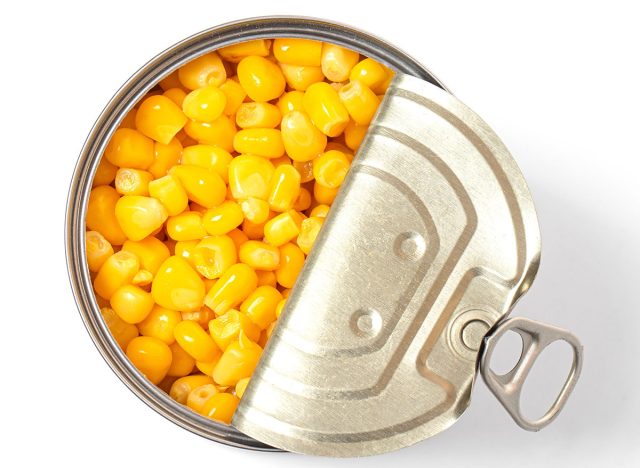
Greg Garrison is the executive chef and partner at Repeal 33 Bar & Restaurant in Savannah, Ga, and he prefers his corn off the cob instead of out of a can. "Canned corn is an absolute no-no! Not only is it the worst version of an American staple, but there just isn't a reason to need it. Corn is readily available year-round and if you decide to preserve your own, freezing the kernels is a far superior method to retain some semblance of flavor and texture."
Mushrooms
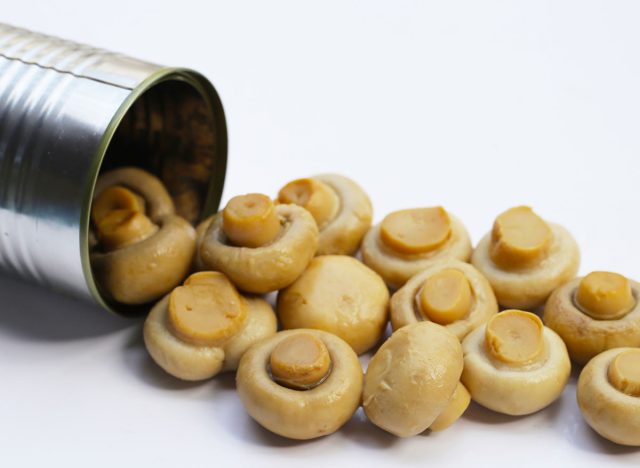
Hathorne is a restaurant in Nashville, Tenn., known for its creative vegetable-forward menu, and executive chef Arin Brewster definitely knows his way around a basket of fresh produce. In fact, he was honored to cook for no less than Thomas Keller recently when the famed chef picked Hathorne as a dining destination during a recent visit to Music City. Brewster offers this advice the next time you hit up your local grocery: "My pick is mushrooms. Canning ruins the incredible texture and flavor of mushrooms in my opinion. Most grocery stores offer a fresh button mushroom (or better yet shiitake) that will far outdo a canned mushroom."
English Peas
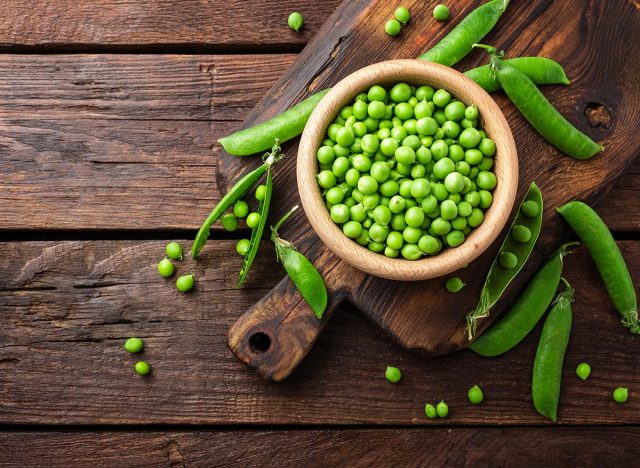
While this might seem like a pretty specific choice for membership in the "no-can" clan, Chris Stewart of The Glass Onion in Charleston, S.C., stands by his opinion. Stewart explains that English peas are among the worst of all canned foods. "Growing up, my mom loved throwing English peas in the microwave," he shares, chuckling. "At a very young age, I remember thinking, 'There is no way I am eating canned vegetables ever again when I grow up!'" Upon meeting his wife, she opted for frozen vegetables when saving time on dinner at home. While Stewart mentions these can sometimes be "a better option over canned vegetables—but only in a pinch," he goes on to say, "It's a must to zhuzh them up a bit with seasonings and butter." Today, Stewart stays away from all canned foods at the Glass Onion and prioritizes the use of locally sourced fresh vegetables and ingredients in all of his dishes.
Asparagus
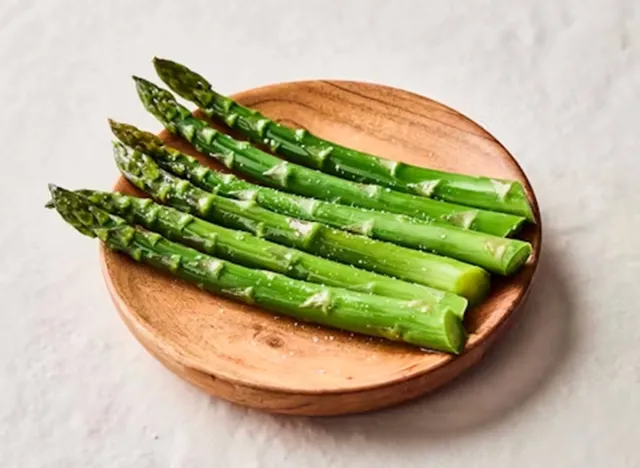
Chef Erik Niel presides over a small restaurant empire in Chattanooga, Tenn., with a trio of popular establishments, Easy Bistro, Main St Meats, and Little Coyote. You won't find any limp green spears in any of his kitchens, including at his home. "The best one I can think of that always sucks is canned asparagus. It's just awful … and has no place at all," Niel says. "It's fresh asparagus or no asparagus! It's all about texture, and there is no way to can asparagus and not make it super mushy and, basically, baby food texture." 'Nuff said.
Fruits
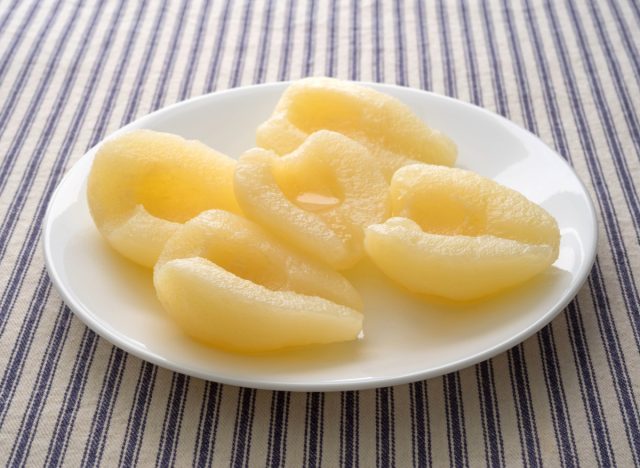
Chef Luis isn't a fan of canned fruits for a practical reason in the kitchen—they just don't work as well in most recipes. "I have found that cooking fresh fruits in a pan makes them much richer and flavorful than canned items. You are able to achieve different thicknesses of syrups depending on cooking time. For example, if you want a thin syrup, you reduce the cooking time and temperature."
Niel's attitude toward canned fruits mirrors Stewart's beef with peas. "I agree with the canned fruit dislike, too. Canned pears and peaches take me back to terrible school lunches—just make it into a proper jam and spread it on toast!"
Meats
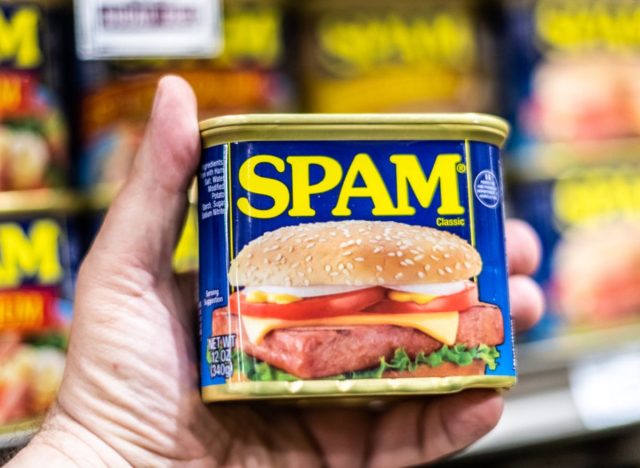
Speaking of "beef," Luis also has issues with meats preserved in tin or aluminum. "I don't recommend using canned meats, as they can't replace or replicate the in-house scratch cooking with fresh ingredients," he says. "If you use canned products, you tend to lose control of the meat quality of your products. You won't be able to obtain different meat temperatures (medium rare, medium well, well done, etc.) when using canned meats. While using canned food can be advantageous or convenient in some instances, it should be avoided in commercial or home kitchens. Canned items tend to have many preservatives that prevent certain deadly microorganisms from growing, and these preservatives change the taste profiles of many cooked meat, vegetable, and fruit items. I recommend using fresh meat, seafood, and produce whenever possible."
Not everyone agrees with Luis on this point, however. Chef Niel counters, "I totally disagree with 'meats' as a category of food that shouldn't come in a can—everybody needs some Vienna sausages from time to time while road-tripping through the South. Plus, canned fish, oysters, octopus, etc. are awesome. Also…Spam rocks!"









